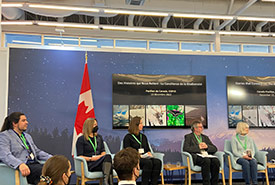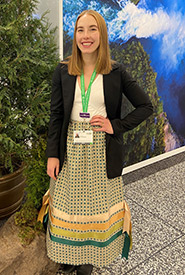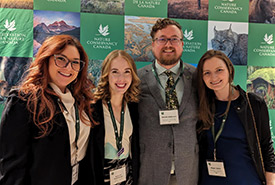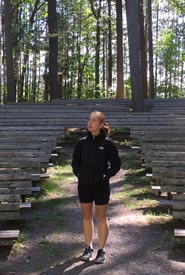The global significance of Indigenous-led conservation

Indigenous-focussed sessions at COP15 (Photo by NCC)
The only way forward to achieve the ambitious conservation goals set globally and supported by Canada is to support Indigenous-led conservation. This sentiment was echoed loudly throughout 15th meeting of the Conference of the Parties to the UN Convention on Biological Diversity (COP15) from all levels of government, organizations and communities from across the world.

Raechel Wastesicoot participating in COP15 sessions, proudly wearing her ribbon skirt (Photo by NCC)
As an Indigenous woman working at the Nature Conservancy of Canada (NCC), I have had the opportunity to work from two canoes. Although I see the land through an Indigenous lens specifically, through my work at NCC and through representing the organization at COP15, I was able to approach land conservation topics in a multi-faceted way. This Two-Eyed Seeing approach, using both Indigenous and non-Indigenous science to create climate solutions in a collaborative way, is the only way that Canada and other countries can make significant advances when it comes to slowing the pace of climate change. The importance of Indigenous science, community-led initiatives and Indigenous Protected and Conserved Areas (when entirely Indigenous-driven), and with our youth increasingly leading the charge, is one of my biggest takeaways from COP15. And this makes me hopeful and inspired for a brighter tomorrow.

Several members of NCC's youth delegation at COP15 (Photo by NCC)
As part of NCC’s COP15 youth delegation, I had the opportunity to learn and evolve my understanding and passion for Indigenous-led and intersectional approaches to land protection alongside a group of equally inspired conservation warriors.
“The momentum building around Indigenous-led conservation and Indigenous Guardians programs gives me hope not only for halting and reversing biodiversity loss, but also as an important act of Reconciliation in Canada,” says Laura Vaughan, NCC youth delegation member and senior development officer. “It’s all of our responsibilities to find ways to support this work and move forward together toward healing our planet.”
Fellow NCC youth delegate Louis-Georges Esquilat, Quebec Ecological Corridors Initiative coordinator, reflected on hearing from global Indigenous perspectives that reiterated how Indigenous Traditional Knowledge contributes directly to nature conservation.
“To me, Indigenous-led conservation acknowledges the importance of different views, knowledge-sharing and the ways to live in harmony with nature,” says Louis-Georges.
Steven Anderson, NCC youth delegate and conservation operations program coordinator, sees Indigenous-led conservation as a critical way for conservation organizations to support and amplify the work being done by Indigenous communities.
“NCC supports Indigenous communities in Manitoba by working together on conservation planning initiatives and collaborating on education and engagement events,” shares Steven. “Indigenous perspectives and connections result in wholistic conservation initiatives. I’m excited by the momentum we have begun with these partnerships and look forward to the thriving world we are supporting together.”
Hearing these reflections from my colleagues makes me even more optimistic about the evolved understanding of what the future of conservation needs to look like in Canada and beyond for there to be positive change and significant steps toward our ambitious goals. The future of conservation is Indigenous, and I am proud to work at an organization with staff who respect Indigenous science and land protection approaches as the pathway forward.


